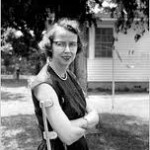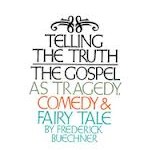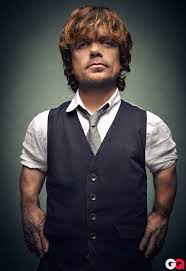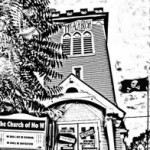From the first line, I love this book, and it’s not even the first line but the quote before the first line that jump starts the whole thing. See, it’s Flannery O’Connor.
I’m haunted by O’Connor. This southern woman with pheasants on her farm who died before forty and wrote short stories about serial killers shooting good Christian grandmas and four-year-old boys drowning themselves in baptismal rivers.
This Flannery O’Connor quote says: The only way to the truth is thru blasphemy. The word blasphemy stirs discomfort and fear in me. It’s the word used when my bookstore friend hands me this book as a gift. But if Flannery O’Connor extols blasphemy and this author gives her the first word, then it’s a ride I can take, I think.
With the Forward’s first paragraphs, I’m into A Prayer for Owen Meany land with the mixing of faith talk with a diminutive but promised-to-be-life-changing person. And then, sentences later, I’m in Frederick Buechner land: the wizard who wrote that the gospel is not just tragedy, comedy, or fairy tale, but all three. This writer wants to add to that list. He seems to think the gospel might also be blasphemy.
Did I mention the main character is a midget? A midget preacher in Portland? So I think of Peter Dinklage. Because with HBO’s Game of Thrones at its peak popularity, who could think of anyone else? And besides, have you not seen The Station Agent? Other details reel me in. The old church bought to be something else — home or antique store. A description of a Portland rain/sun day. Some mumble jumble about Jesus, all unembarrassed-like and written on the sleeve so to speak. God, I think, this writer is either all balls or half loony.
The possibility of either gets me through chapter 1 which is mostly a long winded speech that’s very Ayn Rand-like, except that it seems to be in favor of all she despised faith-wise. But, hey, the author’s already told us in the forward that this midget preacher ends up beheaded in Iraq and becomes a national joke, so why should I let a monologue put me off? Especially since it’s presented like pages in a zine or a very crude, homemade graphic novel. Imagine photoshopped newsprint collages with cut and paste items and word balloons to represent the reality of these characters: bent, tilted, but somehow maybe still impossibly true and of value.
So I’m in. Into A Very Minor Prophet by James Bernard Frost. I may not finish it; I seldom do. But I’ll give it two chapters and see if the ghosts of these writers I’ve cited pull me through on the words of their new friend. Or, if their new friend forsakes them and leads me to hell — a place he alludes to in the Acknowledgements as his likely afterlife — I’ll give it back with a smile.





Thanks for this splendid teaser, Rick.
I was likewise lured into Frost’s lair with the quote from Flannery O’Connor. She tops my list of favorite writers, reminding us that the Holy Ghost can seem very strange to communicants of the status quo.
If this novel were made into a movie — Lord help us — Peter Dinklage could make portions of the preacher’s sermons ring like gospel truth. I became an admirer when I first saw him in The Station Agent and Tiptoes.
It was harder for me to hear that ring of truth while looking at the book’s cut-and-pasted images of Hervé Jean-Pierre Villechaize (aka “Tattoo”). Yet somewhere in Portland, I bet hipsters are watching re-runs of Fantasy Island. I could probably join them for an episode or two.
I read the whole book and may comment again later, after others have had a chance to review.